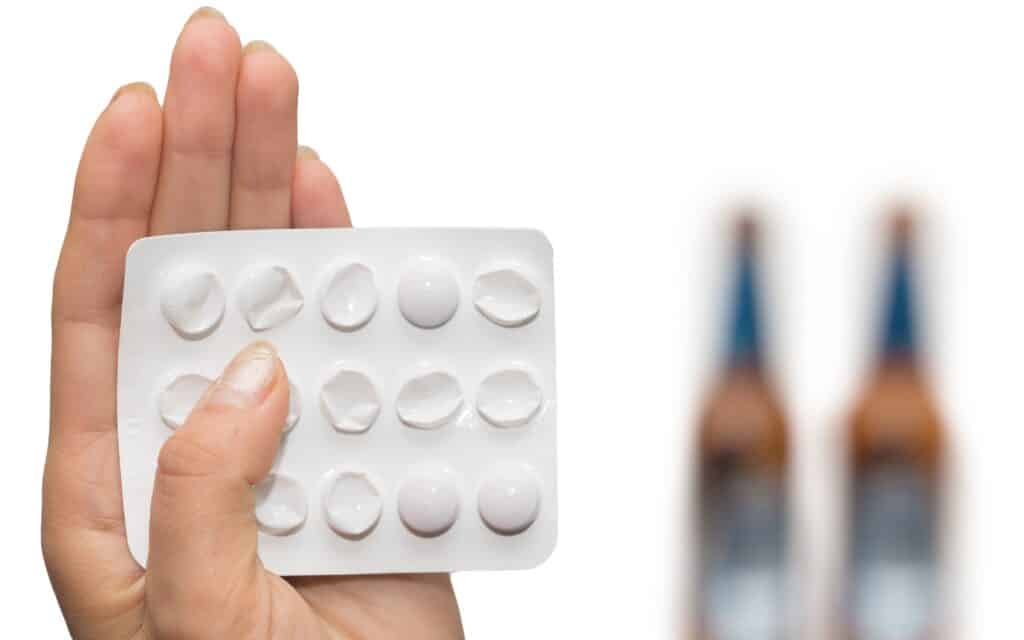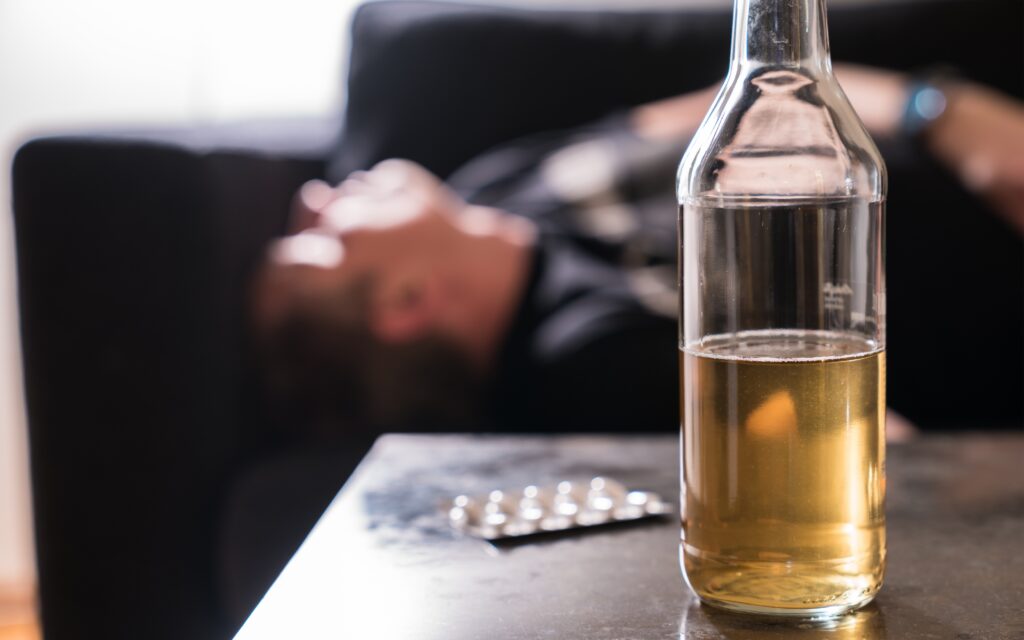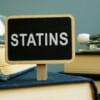Can you take melatonin with alcohol?
What happens if you do?
Melatonin is one of the most popular supplements for sleep out there, but most people aren’t fully sure how to take it safely. Just because melatonin is a natural sleep supplement, doesn’t mean it will mesh well with all of your nighttime routines.
Melatonin and wine, or melatonin and beer might be a problematic mix.
If you’re thinking of starting to use melatonin to improve your sleep habits, but you also like a drink before bed from time to time, here’s what you need to know.
What can’t you take with melatonin?
Melatonin is a naturally occurring hormone produced in the human brain. The main role of the substance is to help us fall asleep and sleep soundly.
The natural melatonin you create yourself is produced through tryptophan in the pineal gland. Crucially, melatonin also comes from serotonin, which assists with regulating our sleep/wake cycle. Because it’s a natural substance, most people assume it’s safe to take melatonin with anything.
However, melatonin and alcohol can lead to some negative effects.
Melatonin can also interact with substances outside of alcohol, such as:
- Sedative medications or CNS depressants: Don’t use melatonin with other medications that make you sleepy, no matter how bad you think your insomnia is.
- Caffeine: Caffeine decreases the amount of natural melatonin in the body and may decrease the effectiveness of the supplements.
- Fluvoxamine: Fluvoxamine may increase the amount of melatonin absorbed by the body, increasing the risks of side effects.
- Blood clotting medications: Melatonin may slow blood clotting. Taking this substance along with medications which also impact clotting may be dangerous.
- Birth control pills: Birth control pills may increase the amount of melatonin the body creates, causing interactions with melatonin.

Can you take melatonin with alcohol?
Generally, you should always avoid taking melatonin with alcohol. While a small amount of melatonin and alcohol may not cause severe side effects, mixing melatonin and alcohol can be dangerous.
Although alcohol can help to make you feel sleepy, using it with melatonin won’t increase the sedative effects of either substance.
Alcohol either strengthens diminishes the impact of melatonin supplements and interrupts the natural sleep/wake cycle. The way your body reacts to a combination of melatonin and alcohol can differ, depending on your background.
Mixing melatonin and alcohol is likely to increase your risk of serious side effects like drowsiness, dizziness, and trouble breathing.
If you’re already at higher risk of various conditions like heart problems, dizziness, or trouble breathing, your doctor will advise you to avoid mixing melatonin and alcohol entirely.
The possible effects of mixing alcohol with melatonin
Alcohol might have sedative effects on some people, but it also significantly disrupts the sleep-wake cycle – which is what melatonin is supposed to regulate.
Alcohol also causes some of your muscles to work differently, which can expose you to more risks as you sleep.
The most worrying side effects of using melatonin and alcohol include:
Breathing difficulties
Mixing melatonin and alcohol use can cause the muscles in the throat to loosen, which makes it harder to open your airways. If you already have issues with sleeping when you go to bed, or you snore due to sleep apnea, this can cause a serious health issue. Stay away from this combination if you have breathing issues.
Heart rate and cardiac performance
Combining melatonin and wine, beer, or any other alcohol can also impair cardiac function. Studies show melatonin with alcohol can lead to a reduction in heart rate, as well as problems with the functioning of the heart. If you already have cardiovascular issues, this combination may be particularly dangerous.
Reduced sleep quality
While sleeping pills and melatonin are intended to help you get to sleep, and stay asleep, alcohol only helps you to drift off. After this, the alcohol in your system causes frequent waking periods and stops you from enjoying deep-weave sleep.
Swelling and flushing
Some people who combine melatonin and alcohol say they notice swelling in their feet and ankles and flushing around their face and upper body which make it harder to relax, or focus.
Cognition issues
Combining melatonin and alcohol can increase your feelings of drowsiness, which make it harder to think clearly. People taking melatonin and beer might have trouble walking in a straight line and will often feel dizzy. You may also notice you’re more likely to feel groggy and disoriented when you wake up.
Mixing melatonin and alcohol: Common questions
Ideally, you would avoid drinking alcohol entirely if you’re using melatonin.
If you’re planning on using both melatonin and alcohol at the same time for any reason, make sure you know the answers to these questions first.
How long should I wait to take melatonin after drinking alcohol?
If you must combine the two, it’s best to wait at least two to three hours after drinking before you use your melatonin sleep aid.
Mixing melatonin and alcohol can be more dangerous for some people than others. If you’re concerned about mixing alcohol with sleeping pills and melatonin, speak to your doctor first.
Does melatonin cause side effects on its own?
Notably, avoiding the combination of melatonin and alcohol won’t necessarily mean you don’t notice any side effects from this sleep aid.
Melatonin is widely well-tolerated by most people, but some find when they first start taking it, they notice symptoms similar to a hangover.
Melatonin can sometimes cause nausea, and daytime sleepiness or drowsiness. You might also experience changes to your body temperature, or more frequent sweating at night.
Is melatonin bad for your liver?
Although there have been some concerns about over exposure to melatonin in the past, studies indicate there aren’t any significant threats to the liver when melatonin is used correctly. Despite regular use as a sleeping aid, melatonin has not been consistently linked to any instances of clinically proven liver injuries.
Does melatonin make you groggy in the morning?
Many sleeping aids can make you feel a little groggy in the morning. Often, feelings of sleepiness will dissipate as your body gets used to a new sleep/wake cycle.
You may also need to talk to your doctor about whether you should reduce or increase your melatonin dose to avoid a “melatonin hangover”.
Does melatonin give you a hangover?
In some cases, mixing melatonin with wine or beer could also increase your chances of negative side-effects the morning after. Melatonin can cause headaches and similar side effects feel similar to a hangover.

How long after drinking can you take sleeping pill?
Alcohol and sleeping pills are rarely a good mix.
Melatonin and alcohol are just one example of a combination which can lead to negative side effects. Some forms of sleeping pills are even more dangerous if you’re drinking alcohol at the same time.
If you’re using another form of sleeping pill, always follow the instructions provided in the patient leaflet and by your doctor to avoid negative side effects.
For melatonin, you should:
- Wait until at least 2 or 3 hours after drinking before you take your supplement
- Avoid other substances which make you drowsy, such as foods with tryptophan (turkey and milk), teas designed to make you sleepy, and sleep supplements
- Take your melatonin around 30 minutes to an hour before going to bed. It’s best to have a consistent night-time routine to help with your sleep pattern.
- Avoid devices which emit blue light after taking melatonin to help preserve your circadian rhythm and improve your ability to drift off.
- Speak to your doctor about taking melatonin alongside other medications. You may need to stagger your medications to avoid interactions
What about melatonin and cannabis?
While some people use alcohol as a tool to help with sleep, others turn to alternative options. Cannabis and CBD oils are gaining a lot of attention as potential sleep aids.
The impact of cannabis on sleep appears to be positive, with some studies referencing the drug’s ability to improve the production of melatonin and protect the circadian rhythm.
Though melatonin and cannabis, or CBD oil and melatonin may be safe for you to take separately, research is still ongoing into the influence these two products have when used together.
Some experts believe the most negative side effect the two products have when combined is reducing the likelihood of memorable dreams.
However, it’s best to avoid using any additional substances alongside melatonin unless you get express permission to do so from a medical professional.
When taking substances like melatonin, it’s usually safest to avoid any other product which may increase your feeling of drowsiness.
Melatonin plus alcohol = not a good idea
Melatonin and alcohol aren’t a great mix.
In fact, any substance which can affect your sleep/wake cycle, cause drowsiness, or change the quality of sleep you get should not be used alongside melatonin.
Though it might be tempting to use melatonin and beer together, or even melatonin and weed, it’s important to stay safe.
While melatonin is a natural substance, it can still cause dangerous side effects when you use it incorrectly.
Taking melatonin and alcohol together or using melatonin alongside other substances can cause a lot more than a bad hangover.
When you start taking melatonin for the first time, be patient and wait for the substance to have an impact.
It may take a while before you notice the results, but using other products to try and increase your chances of success, won’t have the results you’re looking for.
Speak to your doctor about your concerns and follow their recommendations on how to use sleep aids as safely and effectively as possible.
To learn more about medical treatments for sleep disorders, check out our other guides:
—Is Mirtazapine or Trazodone better for insomnia?
—Does Amitriptyline help you with sleepless nights?
—Quetiapine as a short term medical sleep solution
—Are tricyclic antidepressants an insomnia cure?
Siestio. Sleep matters.
Medical disclaimer
You must not rely on the information provided on our website as an alternative to medical advice from your doctor or other healthcare professionals. For more information read our full disclaimer here.







